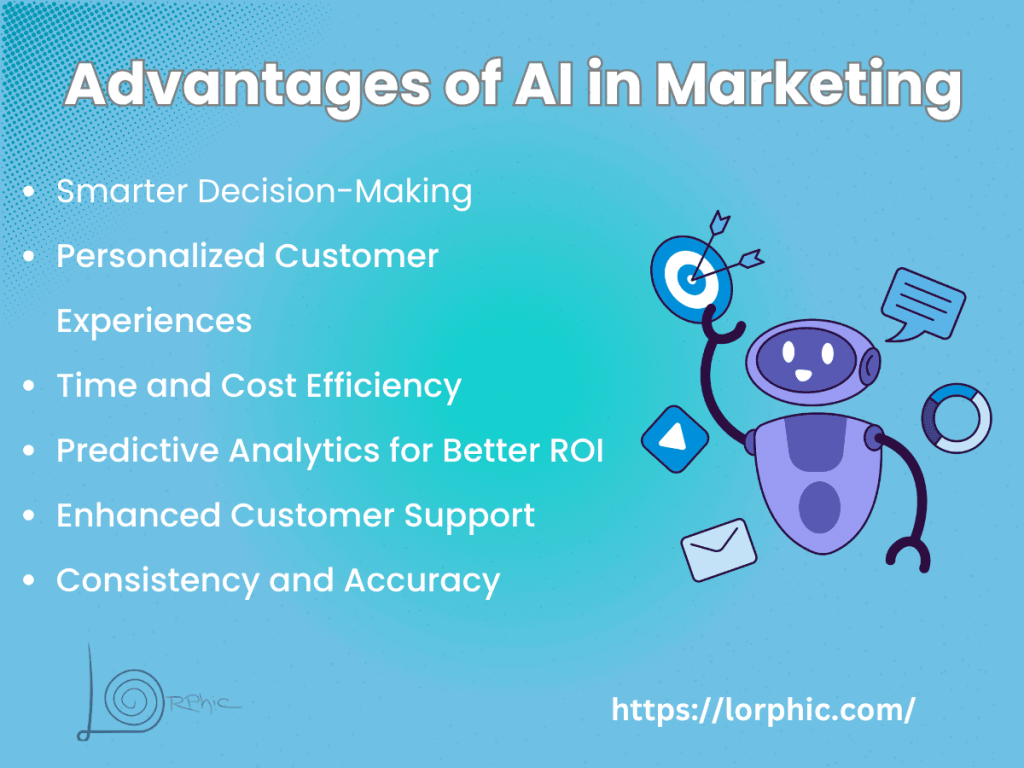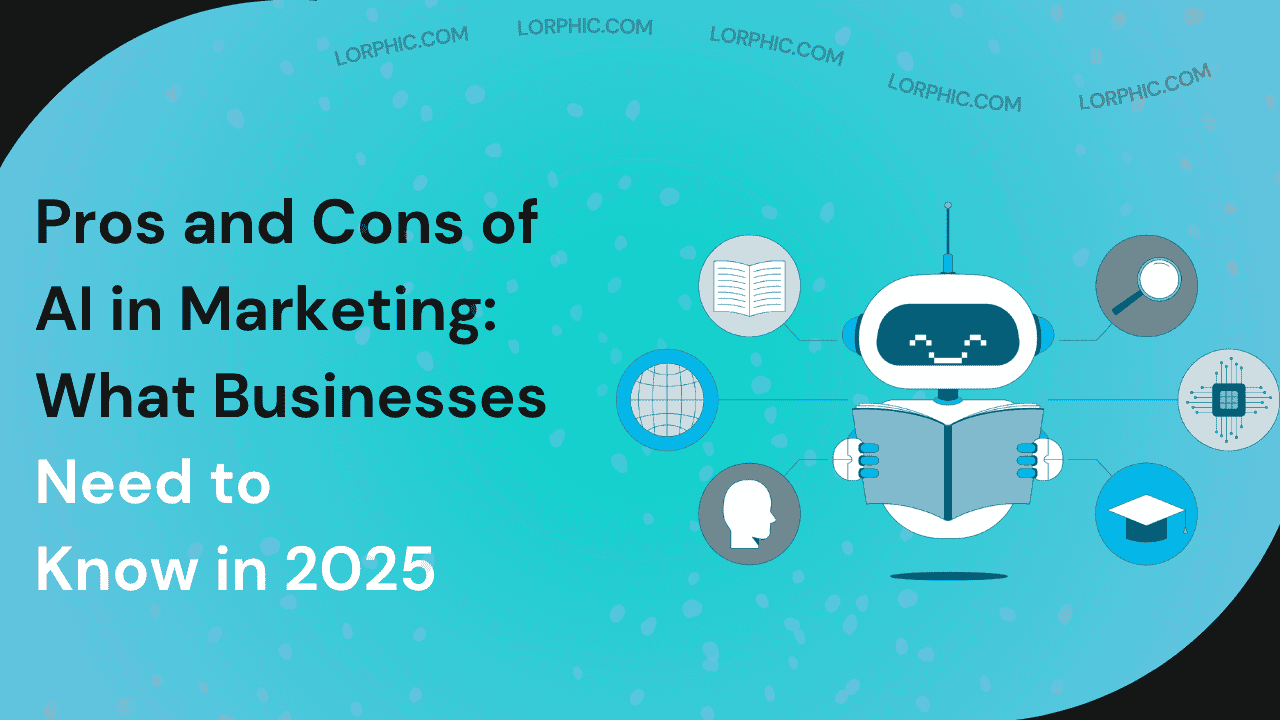Artificial Intelligence has rapidly transformed from a futuristic idea into a key component of modern marketing strategies. It is helping businesses automate repetitive tasks, predict customer preferences, and create campaigns that truly connect with their audiences. With AI, marketers can make smarter and faster decisions backed by accurate data rather than guesswork.
As we step into 2025, AI in marketing is no longer just a trend; it has become the driving force behind personalized and efficient marketing approaches. Yet, while its benefits are undeniable, there are also challenges that come with relying on this technology.
This guide will take a closer look at how AI is reshaping the marketing world, highlight pros and cons of AI in marketing, and discuss what the future might look like for businesses that embrace it.
How AI is Reshaping Marketing in 2025?
Marketing in 2025 looks very different from what it was a few years ago. With the growing use of Artificial Intelligence, marketers can now understand their customers better, save time on repetitive work, and deliver highly personalized experiences in real time.
Here’s how AI is transforming marketing today:
- Predictive analytics helps businesses anticipate customer behavior and optimize campaigns before they are launched.
- Chatbots and virtual assistants provide customer support at all hours, improving both response times and engagement levels.
- AI-powered content tools assist in creating headlines, blogs, and social media posts that match the brand’s voice and meet user intent.
- Ad optimization platforms use AI to automatically adjust bids, targeting, and creative elements to achieve stronger returns on investment.
AI in social media marketing is driving higher engagement and conversions through automated content scheduling, audience analysis, and segmentation tools.
In short, AI allows marketers to spend more time on strategy and creative thinking while intelligent algorithms manage the heavy lifting behind the scenes.
Pros and Cons of AI in Marketing
AI brings undeniable efficiency and innovation to marketing. Yet, it’s not a one-size-fits-all solution. Understanding both sides, the benefits and drawbacks, is key to using AI wisely and effectively.
Let’s break it down.
Advantages of AI in Marketing

1. Smarter Decision-Making
AI has the ability to process and analyze vast amounts of data far beyond human capabilities. It can examine customer demographics, purchasing habits, website interactions, social media behavior, and more to uncover patterns that guide marketing decisions. These insights allow marketers to identify which campaigns are most likely to succeed, what messaging resonates with audiences, and how to allocate resources efficiently.
By leveraging AI, businesses can move from relying on intuition to making fully informed, data-driven decisions. This leads to higher accuracy in targeting, better campaign strategies, and stronger overall performance.
2. Personalized Customer Experiences
Today’s consumers expect brands to understand them and provide experiences that feel tailored. AI makes this possible at scale by analyzing user behavior, preferences, and past interactions. It can deliver personalized product recommendations, email content, website experiences, and advertisements for each individual.
For example, streaming platforms like Netflix use AI to suggest movies and shows based on viewing history, while Spotify creates custom playlists that match a user’s listening habits. When applied to marketing, personalization enhances customer satisfaction, strengthens loyalty, and significantly increases conversion rates, ensuring each interaction feels meaningful and relevant.
3. Time and Cost Efficiency
AI helps marketers save both time and money by automating repetitive tasks that would otherwise take hours to complete. These tasks include scheduling social media posts, segmenting email lists, generating reports, analyzing ad performance, and optimizing campaign settings.
Automation allows marketing teams to focus more on strategy, creativity, and innovation, rather than getting bogged down in manual work. Additionally, by reducing human error and increasing efficiency, AI minimizes wasted resources and ensures that campaigns deliver better results without increasing costs. This combination of time and cost savings makes AI an invaluable tool for businesses of all sizes.
4. Predictive Analytics for Better ROI
One of the most powerful features of AI is predictive analytics, which allows marketers to anticipate future customer behavior. By studying historical data, AI can forecast which leads are most likely to convert, which customers might churn, and which campaigns will achieve the highest engagement. Marketers can use these insights to allocate budgets more effectively, prioritize high-value prospects, and optimize campaigns before they run. In fact, organizations using AI in marketing reported up to a 41 percent increase in revenue and a 32 percent reduction in customer acquisition costs.
This proactive approach leads to improved return on investment, smarter decision-making, and the ability to address challenges before they impact results. Predictive analytics also allows teams to measure potential outcomes and refine strategies for long-term success.
5. Enhanced Customer Support
AI has transformed customer support by providing fast and reliable assistance through chatbots and virtual assistants. These systems respond to inquiries instantly, answer common questions, and even guide customers through purchasing processes.
By handling routine issues automatically, AI frees human support agents to focus on complex cases that require problem-solving and empathy. This improves overall customer satisfaction, shortens response times, and enhances engagement. Businesses also benefit from reduced support costs while maintaining high-quality service, allowing them to build stronger, lasting relationships with their customers.
6. Consistency and Accuracy
AI delivers consistent results across all marketing channels without fatigue or errors. Unlike humans, AI does not tire, lose focus, or make mistakes due to oversight. Whether it is posting social media content, sending emails, or updating ad campaigns, AI ensures that messages remain accurate, on-brand, and engaging.
This consistency not only maintains professionalism but also strengthens brand trust and recognition. By reducing the likelihood of mistakes and providing reliable output, AI allows marketing teams to operate at scale while keeping the quality of their campaigns high.
Disadvantages of AI in Marketing
While AI offers many advantages for marketers, it also comes with challenges that businesses need to address carefully. Understanding these limitations helps companies use AI effectively without compromising creativity, ethics, or strategy.
1. Lack of Human Creativity
AI can process data, suggest ideas, and even generate content, but it cannot replicate human creativity or emotional intelligence. It can create blog drafts, email templates, or social media captions, but these often lack the nuanced storytelling, humor, or empathy that resonates with audiences.
Some specific limitations include:
- AI cannot fully capture brand personality in content.
- It may struggle with innovative campaign concepts or out-of-the-box thinking.
- AI-generated messaging can feel repetitive if overused.
Because of this, the most successful marketers treat AI as a tool to assist their creative work rather than replace it entirely. Human insight remains crucial for building emotional connections with customers.
2. Data Privacy and Ethical Concerns
AI relies heavily on consumer data, which raises privacy and ethical questions. Customers are increasingly aware of how their personal information is collected and used. Marketers must ensure transparency and comply with privacy regulations such as GDPR and CCPA. Failing to protect data or using it unethically can erode trust, harm reputation, and even lead to legal consequences.
3. High Implementation Costs
Advanced AI systems can require a significant investment. Costs may include software subscriptions, integration with existing systems, maintenance, and staff training. This may make it harder for small businesses or startups. However, companies can mitigate this by starting with simpler, lower-cost AI tools for tasks like email marketing automation or social media scheduling before scaling to more advanced solutions.
4. Risk of Overdependence on Automation
Relying too heavily on AI and automation can make marketing feel impersonal or disconnected from the audience. If not carefully monitored, AI-generated emails, posts, or recommendations may appear robotic, generic, or irrelevant.
Key points to consider:
- Overuse of AI can reduce brand authenticity.
- Automated messaging may fail to respond appropriately to unexpected customer feedback.
- Lack of human oversight can lead to missed opportunities for creative engagement.
To avoid these pitfalls, marketers must balance automation with human input, ensuring campaigns maintain a personal touch while benefiting from efficiency.
5. Potential Bias and Inaccurate Insights
AI learns from the data it is given. If the data is incomplete or biased, the system’s recommendations and insights will also be flawed. For instance, algorithms trained on unbalanced datasets may unfairly target or exclude certain groups. Regular audits, diverse data inputs, and human oversight are essential to minimize bias and maintain accuracy in campaigns.
6. Learning Curve and Skill Gap
Implementing AI requires technical understanding and experience. Many marketers are still learning how to integrate AI into their workflows, which can slow adoption and reduce the effectiveness of campaigns. Continuous training, experimentation, and collaboration between marketing and data teams are essential to overcome this challenge and fully leverage AI capabilities.
Conclusion
Artificial intelligence is reshaping marketing in ways that were hard to imagine just a few years ago. It allows businesses to save time, improve accuracy, and deliver more personalized experiences while boosting return on investment. By automating repetitive tasks, optimizing campaigns, and analyzing data in real-time, AI helps marketers work smarter and make decisions that drive measurable results.
At the same time, it is essential to recognize the challenges that come with AI. Issues such as data privacy, ethical considerations, and the need for human creativity cannot be overlooked. AI works best when it complements human skills rather than replaces them.
FAQ’s
What are the main pros and cons of AI in marketing?
The main pros include automation, personalization, improved ROI, and better data insights. The cons involve cost, data privacy concerns, and the lack of human creativity.
Is AI marketing suitable for all industries?
Yes, AI can benefit nearly every industry, from retail and healthcare to real estate and finance. However, the level of adoption and effectiveness depends on data availability and business goals.
How can small businesses afford AI marketing tools?
Start small. Use free or affordable AI tools for email marketing, content creation, or social media automation before investing in advanced solutions.
Curated by Lorphic
Digital intelligence. Clarity. Truth.




